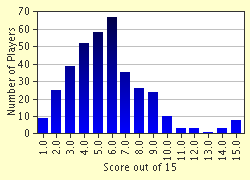Quiz Answer Key and Fun Facts
1. We'll start with an easy one. The following four phrases contain the word "good" in them, as you can plainly see. Now, which one of them does not usually have the French word for "good" when it is used in French?
2. Now for something considerably harder.
Say your friend is being really nerdy today and he says, "I'll be back in 1/100th of a second!" There's actually a very catchy and much more practical way of saying this, even though it really doesn't sound all that technical. What is it?
3. An overused, but admittedly catchy phrase is "you're skating on thin ice", meaning that you're in a bad position, or you're very close to getting yourself into serious trouble. This phrase is used far less often in a literal sense than in an idiomatic one.
With that said, imagine that you're going out for a walk on a cold winter's morning, and you see that the pond is covered in a pretty layer of *blue* ice. Then you see a guy wearing skates and taking a step onto the frozen pond. Now you tell him that he is REALLY skating on "thin ice", so then he cuts a hole in the ice to check its depth. How thick would the ice need to be for him to prove you wrong?
4. One of my favorite catchy phrases is "trip the light fantastic". It happens to be a delightful interpretation of the verb "to dance".
Now, consider that you want to experience a scene right out of a famous song, and you aspire to "trip the light fantastic" with "Mamie O'Rourke". According to the song, where would be the most appropriate setting for you to cut a rug?
5. Another one of my favorite catchy phrases is "I have a sixth sense". And yes, I've been saying that quite often since I saw the movie "The Sixth Sense", with Haley Joel Osment. But that DOESN'T mean that I see the dead! In fact, it's quite a rhetorical phrase because everybody really does have a "sixth sense"!
Now, if Haley Joel Osment's character actually had an extraordinary skill with the real "sixth sense", which of the following statements would be true about him?
6. One of history's greatest sources of catchy phrases was the great Benjamin Franklin, who had a record of saying quotes that are still famous for their wit, quirkiness, and (of course) catchiness. Now, which of the following quotes is NOT from Benjamin Franklin?
7. In case it hasn't dawned on you yet, catchy phrases have become famous in the English language for a garden variety of reasons.
No doubt you've heard the following four phrases before, but which one is famous because it is a "pangram"?
8. For this question, imagine a teenage boy who's obsessed with dominoes. Say he's spent eight hours lining up thousands of dominoes to make a pattern that covers all over the basement of his house. Now imagine that, just before he adds the finishing touches, his annoying little brother knocks over the lead domino and sends all of the other dominoes toppling prematurely.
Given what the name of one of the dots on a domino are called, which of the following catchy phrases is the most appropriate one for the irate teenager to yell at his little brother?
9. Now imagine a teenager whose little brother has just learned a new word: "apocope". The little tyke loves the way the word sounds, and just can't stop blabbering it like a nonstop broken record: "Apocope! Apocope! Apocope!"
Finally, the tormented teenager can't take it anymore. Regarding what "apocope" is, which of the following catchy phrases is the most appropriate one for him to yell in order to get his brother to shut up?
10. Another catchy and rather poetic phrase I love is "burn the midnight oil". It sounds like a line from a Shakespearean play, or from a Robert Frost poem. As you probably guessed, the meaning involves not sleeping when it's late at night.
Anyway, it wasn't until after I heard this saying for the first time that I discovered that there's a rock group called "Midnight Oil". Given what the original saying means, which of the following is the correct description of one of the "Midnight Oil" members who is "burning the midnight oil"?
11. Another one of the many forms of catchy phrases in the English language is the use of product slogans. And some slogans are amazingly catchy, even if they're only one word long!
So, what unusually catchy word was once used as the entire slogan for Hertz Car Rental?
12. Now, one totally overused catchy phrase has bored millions over the decades, and it is, "Time flies". The meaning of that phrase is pretty clear. People have tried spicing up this phrase with different expressions, like "Time flies when you're having fun", and they've even tried to put it in corny puns like "Time flies like an arrow. Fruit flies like a banana." (If you don't get it, read it again more slowly.)
But what's the question? Well, one of the only good twists on this annoyingly catchy phrase happens to be one of the most beautiful expressions I've ever heard, and it is, "Time flies over us, but it leaves its shadow behind." This nostalgic maxim was said by a famous author; the question is, which one?
13. Another slogan that happens to be distinguishingly catchy is "Ah, the power of Cheese". The commercials that present this phrase are appropriately silly, but admirable nonetheless.
Now the question is, which of the following phrases does not refer to a Swiss type of cheese?
14. Yet another catchy simile is "flat as a pancake". This is especially widely used because there aren't very many other versions of it, especially since there aren't many things as flat as a pancake.
Or are there? In Mexico, it's possible that one would say "flat as a tortilla", while in India you might hear "flat as a chapatti", while anyone who's Jewish might say "flat as a latke". Where, then, might you hear the phrase "flat as a 'lefse'"?
15. I'll end with the catchiest phrase of all.
There's an old joke where someone says, "In English, two negatives make a sentence positive, but in other languages, two positives make a sentence negative. But there are absolutely no instances where two positives make a sentence negative."
But the punchline is in the response. The negation to this statement is a two-word colloquial phrase that consists of two positives that actually *do* make a negative response, and it is so catchy that it's frequently used among thousands of people of all ages. What is it?
Source: Author
the_peacemaker
This quiz was reviewed by FunTrivia editor
Exit10 before going online.
Any errors found in FunTrivia content are routinely corrected through our feedback system.

